Donald Trump

We know you are fearful. We know you are still feeling the loss — the loss of a hoped for America that valued diversity, or perhaps the loss of your faith community whose white majority voted for an embodiment of our worst natures.
But we also know that you are ready to resist. You are ready to join the millions who will repeat daily that this ugly rhetoric and dangerous policy proposals cannot become normalized. Racism should not continue as normal, misogyny can’t remain normal, and threatening the well being of those God calls us to welcome cannot become normal.
And so we make this commitment to you: We at Sojourners are all in for whatever is required over the next four years and beyond, as a publication, as a resource, as a community, as a network of activists. Here’s how we get started.

The high school I went to, on Long Island, taught me a lot about race. I learned about overt racism, and what we now call microaggressions.
Over a quarter of a century later, I am under no delusions that we live in a post-racial society.
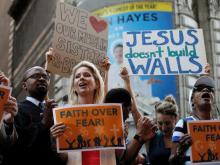
The day after the election, Lisa Sharon Harper nearly gave up the name “evangelical.”
That’s because 81 percent of white evangelical Christians voted for Donald Trump for president, a candidate she described as “representing all of the things Jesus stood against — lust for money, sex, and power.” And their vote propelled the Republican nominee to victory.
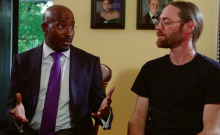
We’re part of a community of people who are using cameras and pens and microphones to explore our differences — and I think that’s what keeps our differences from being explored by knives and bombs and all these other forms of destruction. What you’re doing with a publication, what we're doing with film, it’s all part of the same effort.
That’s where you see democracy at work, and that’s really what we’re rededicating ourselves to.
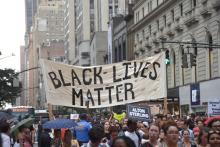
On Nov. 15 the Black Lives Matter Global Network released a statement on the election of Donald Trump, reports Mic. The organization stated that what remains true — and was proven by the results of the 2016 U.S. presidential election — is that “when black people and women build power, white people become resentful.”
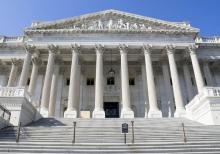
The dismantling of the Voting Rights Act of 1965 by the Supreme Court and conservative state elected officials may be a major reason behind Donald Trump's 2016 U.S. presidential election win, reports ThinkProgress. This was the nation’s first presidential election since the Voting Rights Act's implementation 50 years ago in which the act didn’t provide full protection to voters of color.

This is the world as it is: a world that a robust doctrine of sin should teach us to expect but which idolatry seduces us into forgetting. The chasing after idols is always foolish, but some have the luxury to indulge such foolishness at no physical cost to themselves. The election of Trump is a wake-up call to remember what those who are black, brown, queer, disabled, or a religious minority can only forget at their peril: that oppression is likely to get worse, but the struggle goes on; that the absurd becomes normalized, but must nevertheless be ridiculed even to the point where ridicule feels absurd; that love is more real than hate, but real love means hating what is evil; that the space between the world as it is and the world as it should be must be grieved in order to find the hope to go on; that a truly good, happy and meaningful life cannot involve leisure built off the domination of others. No form of life can be good if it does not have in its institutional forms and ends justice and generosity for all, and pursues this in such a way as to foster the agency of everyone, especially the vulnerable and dependent.

The alliance between Roman Catholics and evangelical Protestants on a range of issues dear to social conservatives has been one of the biggest storylines in religion and politics in recent decades.
But in the Age of Pope Francis and the Era of President Trump that union may be fraying.
In a tweet posted Nov. 14, Jerry Falwell Jr. — a Baptist and leader of the religious right who was one of Trump’s chief promoters — delivered a pithy and pointed critique of the pontiff.
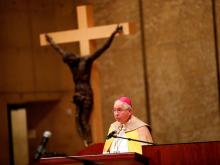
A week after Donald Trump’s stunning election as president sent the country’s governance lurching to the right, the nation’s Catholic bishops sent a message of their own — at least on immigration — by putting Mexican-born Archbishop Jose Gomez of Los Angeles in line to become the first Latino to lead the American hierarchy.
But the vote at their annual fall meeting in Baltimore on Nov. 15 also suggested that the U.S. Conference of Catholic Bishops is still hesitant to fully endorse the more progressive and pastoral approach to ministry that Pope Francis has been championing since his election in 2013.
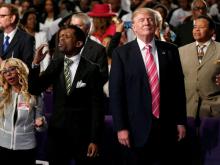
I fear now, as I have feared for months, the impact of his presidency on vulnerable people — including the white and working-class voters in places like my home state of Ohio who lent him their support.
Christians always have disagreements about policy proposals or party platforms during election seasons. But this year, I wonder how white Christians who read the same Scriptures and hold many of the same beliefs that I do could support a man who in word and deed has flaunted the core teachings of our faith.

Americans voted largely along the lines of race, education, and party identification. Nonwhites strongly preferred Clinton, while whites decisively chose Trump. Compared with past Republicans, the businessman received a stunning surge of votes from non-college-educated white voters.
None of this is surprising.
And yet the result upends so much conventional wisdom.
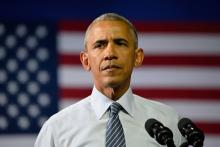
On Nov. 14, in a press conference at the White House, President Obama spoke about the possibility that President-elect Donald Trump may get rid of his executive action "Deferred Action for Childhood Arrivals" (DACA). DACA enables undocumented immigrants who arrived in the U.S. before their sixteenth birthday, before June 15, 2007, to remain in the country without fear of deportation and receive a two-year work permit that can be renewed.
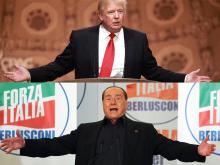
Donald Trump’s victory in the 2016 presidential election has few parallels in the history of contemporary politics in the Western world.
But the closest one is familiar to me: Silvio Berlusconi, the media tycoon who was elected prime minister of Italy — my homeland — for the first time on March 27, 1994 and who served four stints as prime minister until 2011.
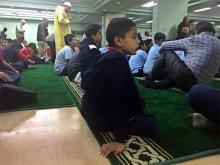
On the day after the election, Mervat Aqqad’s 7-year-old son woke up and asked who got elected president.
When Aqqad broke the news to Ibrahim, a second-grader at the Al-Iman School in Raleigh, his first question was, “Do we have to move now?”
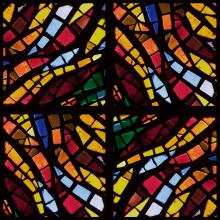
“You are in a year of greatness. You are in a year of restoration,” White preached to a group of some 100 worshippers, almost all of them African-Americans. They had gathered in a large, windowless room at Faith Assembly Christian Center, a simple building in a predominantly black neighborhood of Durham.
Asked afterward about her ties with the president-elect, she declined to be interviewed “out of respect for the church.”
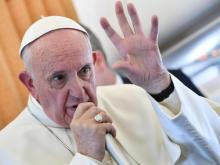
In an interview conducted on Nov. 7, on the eve of the election, and published Friday by an Italian daily, the Argentine pope declined to make any judgment about Trump.
“I do not judge people or politicians,” the pope told Eugenio Scalfari of La Repubblica when asked what he thought of Trump. “I only want to understand what suffering their behavior causes to the poor and the excluded.”
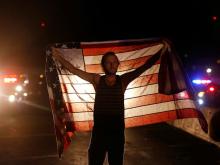
I am upset by the results of the election, and I am particularly saddened that 81 percent of white American evangelicals got into bed with a monster on Nov. 8. But I am also encouraged and have not lost hope.
Here’s why:
Around 11:15 p.m. Tuesday, my 15-year-old daughter, frustrated by all she was seeing on the television, stormed out of the room and announced: “Dad, I am going to bed. I am embarrassed for my country.”
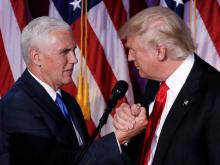
As it is, white evangelicals made up a little more than a quarter of those who turned out to cast their ballots. And by winning 81 percent of their vote, Trump was assured the presidency.
Now, evangelicals are expecting much in return from a president-elect who did not mention God in his victory speech, who was “strongly” in favor of abortion rights until he was against them, who has said he does not believe in repentance, who has made lewd comments admitting to sexual assault.
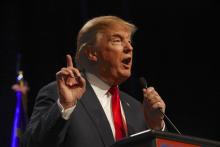
Trump's campaign sues over polling location that allegedly stayed open late for voters.

While Americans watch Hillary Clinton and Donald Trump fighting to the finish, in a noisy and polarized campaign, Germans are quietly debating their own presidential election in far different terms.
Among the names put forward as candidates are two leading Protestant bishops — one of them a woman — and even a respected Muslim writer.